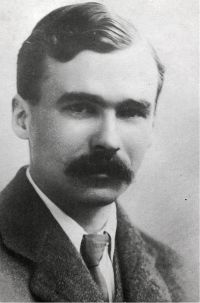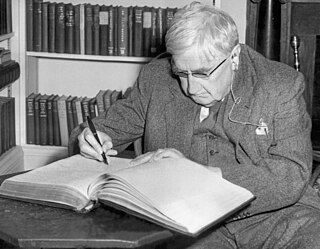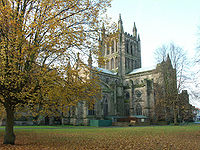
Gustav Theodore Holst was an English composer, arranger and teacher. Best known for his orchestral suite The Planets, he composed many other works across a range of genres, although none achieved comparable success. His distinctive compositional style was the product of many influences, Richard Wagner and Richard Strauss being most crucial early in his development. The subsequent inspiration of the English folksong revival of the early 20th century, and the example of such rising modern composers as Maurice Ravel, led Holst to develop and refine an individual style.

Ralph Vaughan Williams was an English composer. His works include operas, ballets, chamber music, secular and religious vocal pieces and orchestral compositions including nine symphonies, written over sixty years. Strongly influenced by Tudor music and English folk-song, his output marked a decisive break in British music from its German-dominated style of the 19th century.

George Sainton Kaye Butterworth, MC was an English composer who was best known for the orchestral idyll The Banks of Green Willow and his song settings of A. E. Housman's poems from A Shropshire Lad. He was awarded the Military Cross for his gallantry during the fighting at Pozières in the First World War, and died in the Battle of the Somme.
The BBC Symphony Chorus is a British amateur chorus based in London. It is the dedicated chorus for the BBC Symphony Orchestra, though it performs with other national and international orchestras.
Herbert Whitton Sumsion was an English musician who was organist of Gloucester Cathedral from 1928 to 1967. Through his leadership role with the Three Choirs Festival, Sumsion maintained close associations with major figures in England's 20th-century musical renaissance, including Edward Elgar, Herbert Howells, Gerald Finzi, and Ralph Vaughan Williams. Although Sumsion is known primarily as a cathedral musician, his professional career spanned more than 60 years and encompassed composing, conducting, performing, accompanying, and teaching. His compositions include works for choir and organ, as well as lesser-known chamber and orchestral works.

Edgar Leslie Bainton was a British-born, latterly Australian-resident composer. He is remembered today mainly for his liturgical anthem And I saw a new heaven, a popular work in the repertoire of Anglican church music, but during recent years Bainton's other musical works, neglected for decades, have been increasingly available in commercial recordings.

Dona nobis pacem is a cantata written by Ralph Vaughan Williams in 1936 and first performed on 2 October of that year. The work was commissioned to mark the centenary of the Huddersfield Choral Society. Vaughan Williams produced his plea for peace by referring to recent wars during the growing fears of a new one. His texts were taken from the Mass, three poems by Walt Whitman, a political speech, and sections of the Bible. A.V. Butcher has analysed Vaughan Williams' use of the Whitman poems in this composition.

Arwel Hughes OBE was a Welsh orchestral conductor and composer.
Patrick Arthur Sheldon Hadley was a British composer.
The "Sussex Carol" is a Christmas carol popular in Britain, sometimes referred to by its first line "On Christmas night all Christians sing". Its words were first published by Luke Wadding, a late 17th-century poet and bishop of the Catholic Church in Ireland, in a work called Small Garland of Pious and Godly Songs (1684). It is unclear whether Wadding wrote the song or was recording an earlier composition.

Reginald Owen Morris, known professionally and by his friends by his initials, as R.O. Morris, was a British composer and teacher.

Hodie is a cantata by Ralph Vaughan Williams. Composed between 1953 and 1954, it is the composer's last major choral-orchestral composition, and was premiered under his baton at Worcester Cathedral, as part of the Three Choirs Festival, on 8 September 1954. The piece is dedicated to Herbert Howells. The cantata, in 16 movements, is scored for chorus, boys' choir, organ and orchestra, and features tenor, baritone, and soprano soloists.
Philip Napier Miles was a philanthropist and musician in Bristol, and a descendent of the Napier family. He was High Sheriff of Gloucestershire for 1916–17.
Sea Songs is an arrangement of three British sea-songs by the English composer Ralph Vaughan Williams. It is based on the songs "Princess Royal", "Admiral Benbow" and "Portsmouth". The work is a march of roughly four minutes duration. It follows a ternary structure, with opening material based on "Princess Royal" and "Admiral Benbow", with "Portsmouth" forming the central section before a return to the opening material featuring the first two songs.
"The truth sent from above" is an English folk carol of unknown authorship usually performed at Christmas. Collected in the early part of the 20th century by English folk song collectors in Shropshire and Herefordshire, a number of variations on the tune exist, but the text remains broadly similar. The first line of the carol is "This is the truth sent from above".

Ina Boyle was an Irish composer. Her compositions encompass a broad spectrum of genres and include choral, chamber and orchestral works as well as opera, ballet and vocal music. While a number of her works, including The Magic Harp (1919), Colin Clout (1921), Gaelic Hymns (1923–24), Glencree (1924-27) and Wildgeese (1942), received acknowledgement and first performances, the majority of her compositions remained unpublished and unperformed during her lifetime.
Roderick Gregory Coleman Williams OBE is a British baritone and composer.

Folk Songs of the Four Seasons is a cantata for women's voices with orchestra or piano by English composer Ralph Vaughan Williams written in 1949. Based on English folk songs, some of which he had collected himself in the early 20th century, the work was commissioned by the Women's Institute for a Singing Festival held at the Royal Albert Hall on 15 June 1950. The first performance featured a choir of 3,000 women, accompanied by the London Symphony Orchestra conducted by Sir Adrian Boult. Ursula Vaughan Williams remembered that owing to the huge choir "the audience seemed far fewer than the performers".

The First Nowell is a choral work for soprano and baritone soloists, SATB chorus and full orchestra by English composer Ralph Vaughan Williams written in 1958 and completed by Roy Douglas following the composer's death in August of that year.









